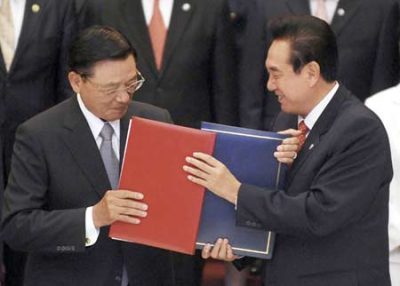In the 1990s Taiwan’s trade with China was only 15 per cent of its estimated potential. By the beginning of this decade that had grown to 32 per cent for exports but was still only 17 per cent for Taiwan’s imports from China. The accession of both economies to the WTO saw rapidly increased realisation of trade and investment potential between Taiwan and China. But even recently, Taiwan’s trade with China as only been running at half its potential is reckoned to be.
The fact is that, up to this point, economic relations between Taiwan and China have been on an uneven footing and the blame did not rest with Beijing. Even after the accession of both China and Taiwan to the WTO a decade ago, the peculiar feature of cross-Straits economic relations was that Taiwan maintained deep discrimination against imports from the mainland, with embargoes on the import of thousands of commodities justified on security grounds but actually reflecting deep protectionism by local interests and unwillingness politically to grasp the full opportunities that opening up trade with China offered to Taiwan.
The ECFA goes a long way to correcting the lop-sidedness and opens opportunities for Taiwan’s fuller integration not only into the Chinese but also the East Asian and global economy. In this week’s lead essay, Shiro Armstrong explains why.
Taiwan’s discriminatory trade and investment policies towards China meant that Taiwan had effectively cut itself off from participating fully in the East Asian production networks. Taiwan is now free to institutionalise economic relations with other important trading partners such as the US, Japan, EU, ASEAN and Australia.
Last week, Tsai Hong-tu, of Taiwan’s APEC Business Advisory Council, announced that he, and Taiwan’s APEC ambassador, former ROC Vice President Lien Chan, are set to meet Obama during a group discussion of trade and related issues in Japan next week and that they plan to seek Obama’s support for Taiwan’s participation in the Free Trade Area of Asia and the Pacific (FTAAP), which the US advocates as a long term objective.
Armstrong argues that this is not Taiwan’s best strategy, now it has China’s blessing to strengthen its trade relations with other countries, and that the economic rationale for Taiwan to join the FTA game is weak.
‘Now that Taiwan can ‘go global’, a strategy of getting its own house in order will deliver larger gains, and faster, than when Taiwan had effectively cut itself off from China’, he says. ‘A global strategy does not discriminate in trade dealings and instead lets market forces determine trade flows and economic integration. Making the Taiwanese economy stronger, more flexible, efficient and resilient will help it reap the gains from globalisation and integration into the Asian and global economy. ECFA is a framework for removing that discrimination against China; Taiwan should not now introduce discriminatory trade elsewhere.’
Taiwan’s position as an outlier in the region, encumbered by few preferential trade agreements, could indeed be a significant strategic advantage as it takes its relationship with the mainland and its economy to the next level. As Armstrong says, a strategy that focuses on domestic reform and global liberalisation (including in the institutionalisation of its relations with other major partners) is likely to yield higher economic gains as well as minimise geopolitical complications than one that dances attendance on the small pickings from bilateral or regional FTAs.
Peter Drysdale is editor of EAF and Emeritus Professor in the Crawford School of Economics and Government at the ANU

